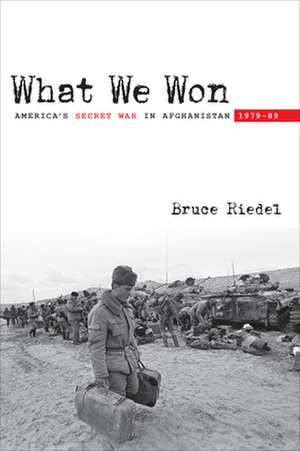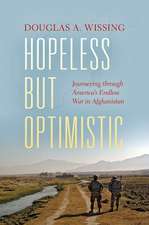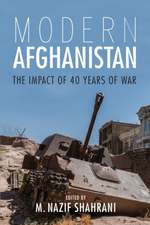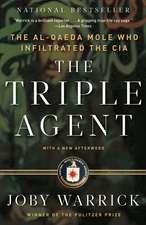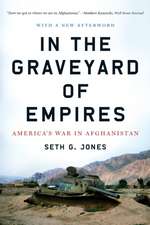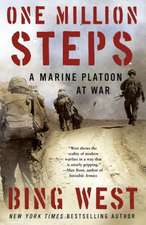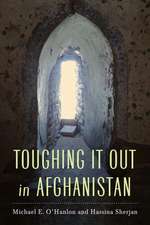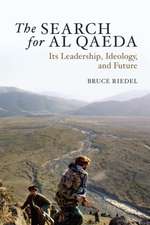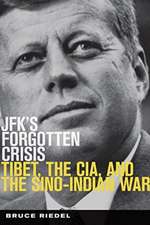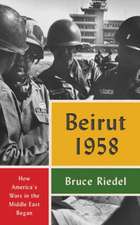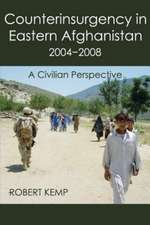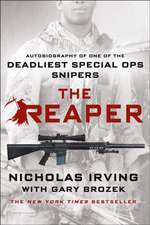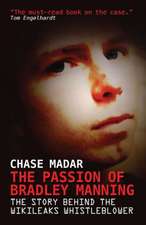What We Won: America's Secret War in Afghanistan, 197989
Autor Bruce Riedelen Limba Engleză Hardback – 28 iul 2014
Vezi toate premiile Carte premiată
IndieFab awards (2014)
In February 1989, the CIA's chief in Islamabad famously cabled headquarters a simple message: "We Won." It was an understated coda to the most successful covert intelligence operation in American history.
In What We Won, CIA and National Security Council veteran Bruce Riedel tells the story of America's secret war in Afghanistan and the defeat of the Soviet 40th Red Army in the war that proved to be the final battle of the cold war. He seeks to answer one simple question—why did this intelligence operation succeed so brilliantly?
Riedel has the vantage point few others can offer: He was ensconced in the CIA's Operations Center when the Soviet Union invaded Afghanistan on Christmas Eve 1979. The invasion took the intelligence community by surprise. But the response, initiated by Jimmy Carter and accelerated by Ronald Reagan, was a masterful intelligence enterprise.
Many books have been written about intelligence failures—from Pearl Harbor to 9/11. Much less has been written about how and why intelligence operations succeed. The answer is complex. It involves both the weaknesses and mistakes of America's enemies, as well as good judgment and strengths of the United States.
Riedel introduces and explores the complex personalities pitted in the war—the Afghan communists, the Russians, the Afghan mujahedin, the Saudis, and the Pakistanis. And then there are the Americans—in this war, no Americans fought on the battlefield. The CIA did not send officers into Afghanistan to fight or even to train.
In 1989, victory for the American side of the cold war seemed complete. Now we can see that a new era was also beginning in the Afghan war in the 1980s, the era of the global jihad. This book examines the lessons we can learn from this intelligence operation for the future and makes some observations on what came next in Afghanistan—and what is likely yet to come.
In What We Won, CIA and National Security Council veteran Bruce Riedel tells the story of America's secret war in Afghanistan and the defeat of the Soviet 40th Red Army in the war that proved to be the final battle of the cold war. He seeks to answer one simple question—why did this intelligence operation succeed so brilliantly?
Riedel has the vantage point few others can offer: He was ensconced in the CIA's Operations Center when the Soviet Union invaded Afghanistan on Christmas Eve 1979. The invasion took the intelligence community by surprise. But the response, initiated by Jimmy Carter and accelerated by Ronald Reagan, was a masterful intelligence enterprise.
Many books have been written about intelligence failures—from Pearl Harbor to 9/11. Much less has been written about how and why intelligence operations succeed. The answer is complex. It involves both the weaknesses and mistakes of America's enemies, as well as good judgment and strengths of the United States.
Riedel introduces and explores the complex personalities pitted in the war—the Afghan communists, the Russians, the Afghan mujahedin, the Saudis, and the Pakistanis. And then there are the Americans—in this war, no Americans fought on the battlefield. The CIA did not send officers into Afghanistan to fight or even to train.
In 1989, victory for the American side of the cold war seemed complete. Now we can see that a new era was also beginning in the Afghan war in the 1980s, the era of the global jihad. This book examines the lessons we can learn from this intelligence operation for the future and makes some observations on what came next in Afghanistan—and what is likely yet to come.
| Toate formatele și edițiile | Preț | Express |
|---|---|---|
| Paperback (1) | 211.74 lei 6-8 săpt. | |
| Brookings Institution Press – 28 iul 2014 | 211.74 lei 6-8 săpt. | |
| Hardback (1) | 191.25 lei 3-5 săpt. | |
| Brookings Institution Press – 28 iul 2014 | 191.25 lei 3-5 săpt. |
Preț: 191.25 lei
Nou
Puncte Express: 287
Preț estimativ în valută:
36.60€ • 38.07$ • 30.22£
36.60€ • 38.07$ • 30.22£
Carte disponibilă
Livrare economică 24 martie-07 aprilie
Preluare comenzi: 021 569.72.76
Specificații
ISBN-13: 9780815725848
ISBN-10: 0815725841
Pagini: 189
Dimensiuni: 152 x 229 x 19 mm
Greutate: 0.48 kg
Editura: Brookings Institution Press
Colecția Brookings Institution Press
ISBN-10: 0815725841
Pagini: 189
Dimensiuni: 152 x 229 x 19 mm
Greutate: 0.48 kg
Editura: Brookings Institution Press
Colecția Brookings Institution Press
Notă biografică
Bruce Riedel is senior fellow and director of the Brookings Intelligence Project. Riedel joined Brookings following a thirty-year career at the Central Intelligence Agency. He served as a senior adviser to four U.S. presidents on South Asia and the Middle East, working as a senior member of the National Security Council. In 2009 President Obama made him chairman of a strategic review of American policy in Afghanistan and Pakistan. He is author of the Brookings best seller The Search for al Qaeda: Its Leadership, Ideology, and Future.
Descriere
In February 1989, the CIA's chief in Islamabad famously cabled headquarters a simple message: "We Won." It was an understated coda to the most successful covert intelligence operation in American history.
In What We Won, CIA and National Security Council veteran Bruce Riedel tells the story of America's secret war in Afghanistan and the defeat of the Soviet 40th Red Army in the war that proved to be the final battle of the cold war. He seeks to answer one simple question—why did this intelligence operation succeed so brilliantly?
Riedel has the vantage point few others can offer: He was ensconced in the CIA's Operations Center when the Soviet Union invaded Afghanistan on Christmas Eve 1979. The invasion took the intelligence community by surprise. But the response, initiated by Jimmy Carter and accelerated by Ronald Reagan, was a masterful intelligence enterprise.
Many books have been written about intelligence failures—from Pearl Harbor to 9/11. Much less has been written about how and why intelligence operations succeed. The answer is complex. It involves both the weaknesses and mistakes of America's enemies, as well as good judgment and strengths of the United States.
Riedel introduces and explores the complex personalities pitted in the war—the Afghan communists, the Russians, the Afghan mujahedin, the Saudis, and the Pakistanis. And then there are the Americans—in this war, no Americans fought on the battlefield. The CIA did not send officers into Afghanistan to fight or even to train.
In 1989, victory for the American side of the cold war seemed complete. Now we can see that a new era was also beginning in the Afghan war in the 1980s, the era of the global jihad. This book examines the lessons we can learn from this intelligence operation for the future and makes some observations on what came next in Afghanistan—and what is likely yet to come.
In What We Won, CIA and National Security Council veteran Bruce Riedel tells the story of America's secret war in Afghanistan and the defeat of the Soviet 40th Red Army in the war that proved to be the final battle of the cold war. He seeks to answer one simple question—why did this intelligence operation succeed so brilliantly?
Riedel has the vantage point few others can offer: He was ensconced in the CIA's Operations Center when the Soviet Union invaded Afghanistan on Christmas Eve 1979. The invasion took the intelligence community by surprise. But the response, initiated by Jimmy Carter and accelerated by Ronald Reagan, was a masterful intelligence enterprise.
Many books have been written about intelligence failures—from Pearl Harbor to 9/11. Much less has been written about how and why intelligence operations succeed. The answer is complex. It involves both the weaknesses and mistakes of America's enemies, as well as good judgment and strengths of the United States.
Riedel introduces and explores the complex personalities pitted in the war—the Afghan communists, the Russians, the Afghan mujahedin, the Saudis, and the Pakistanis. And then there are the Americans—in this war, no Americans fought on the battlefield. The CIA did not send officers into Afghanistan to fight or even to train.
In 1989, victory for the American side of the cold war seemed complete. Now we can see that a new era was also beginning in the Afghan war in the 1980s, the era of the global jihad. This book examines the lessons we can learn from this intelligence operation for the future and makes some observations on what came next in Afghanistan—and what is likely yet to come.
Premii
- IndieFab awards Gold Medal Winner, 2014
